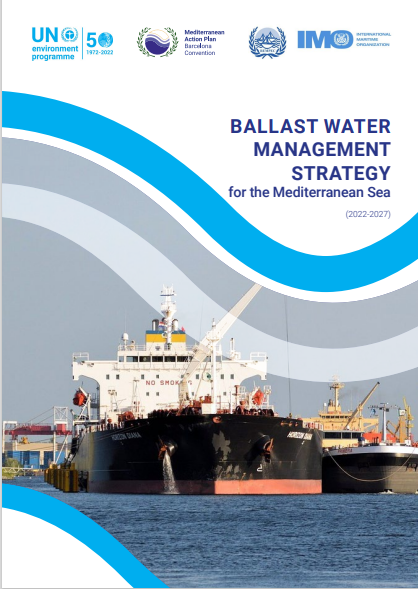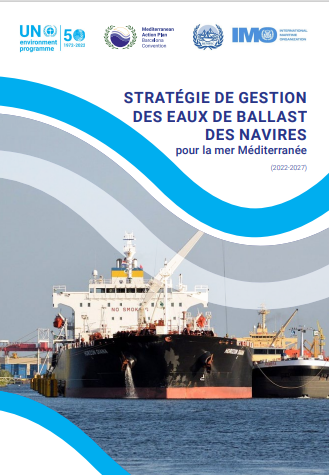Ballast Water Strategy
About the Ballast Water Management Strategy
Over the past two decades, ships’ ballast water has been recognised as one of the major vectors for the introduction of harmful aquatic organisms and pathogens into the marine environment and the introduction of invasive species was recognised as one of the four biggest threats to the marine environment.
The activities of the International Maritime Organization (IMO) to address this issue have primarily included the development of a regulatory regime – initially through the development and adoption of Guidelines, and culminating in the adoption of the International Convention for the Control and Management of Ships’ Ballast Water and Sediments (BWM Convention) in February 2004, which entered into force on 8 September 2017.
In the context of a regional effort, the Mediterranean Strategy on Ships’ Ballast Water Management (BWM), including its Action Plan and Timetable as well as -the “General Guidance on the Voluntary Application of the D1 Ballast Water Exchange Standard by Vessels Operating between the Mediterranean Sea and the North-East Atlantic and/or the Baltic Sea” was adopted by the Contracting Parties to the Barcelona Convention in 2009 (Decision IG.20/11).
The Mediterranean BWM Strategy aims to establish the framework for a coordinated regional approach in the Mediterranean on ships’ ballast water control and management which is consistent with the requirements and standards of the International Convention for the Control and Management of Ship’s Ballast Water and Sediments (BWM), 2004, as outlined in its Article 13.3.
Strategic priorities
The Mediterranean BWM Strategy is composed of eight strategic priorities and of an Action Plan and Workplan for its implementation between 2011 and 2015.
- Strategic Priority 1 – Support international instruments developed to minimise the introduction of invasive alien species in the Mediterranean;
- Strategic Priority 2 – Maintain capacity-building activities and initiatives in the Mediterranean region;
- Strategic Priority 3 – Develop advanced knowledge on environmental condition of the Mediterranean and ships’ mediated introduction of invasive alien species;
- Strategic Priority 4 – Use risk assessment as a reliable tool to assist in ballast water management decision-making and in compliance, monitoring and enforcement procedures;
- Strategic Priority 5 – Decide upon voluntary regional arrangements in the Mediterranean and ensure sub-regional and national strategies are in line with these;
- Strategic Priority 6 – Consider other regional seas strategies and initiatives;
- Strategic Priority 7 – Keep the Strategy and Action Plan under review and assess their implementation progress; and
- Strategic Priority 8 – Work on the identification of adequate resources to implement activities under the Strategy and Action Plan.
Main measures
The Mediterranean BWM Strategy’s Action Plan identifies eight main measures to be taken at regional level, sub-regional or national level in accordance with the Strategic Priorities, as follows:
- Action 1 – Ratify the International Convention for the Control and Management of Ships’ Ballast Water and Sediments (BWM Convention);
- Action 2 – Adopt harmonised arrangements for ballast water exchange in the Mediterranean region;
- Action 3 – Establish a solid Compliance, Monitoring and Enforcement (CME) system in the Mediterranean region;
- Action 4 – Establish a survey, biological monitoring and risk assessment system for Mediterranean ports;
- Action 5 – Enhance expertise; facilitate knowledge transfer and capacity building in the Mediterranean region;
- Action 6 – Enhance public awareness on ships’ ballast water and invasive alien species issues;
- Action 7 – Set-up a web-based Mediterranean mechanism for exchanging information; and
- Action 8 – Incorporate the Action Plan evaluation within the Barcelona Convention reporting system and procedure.
The Mediterranean BWM Strategy is the result of the work of the Mediterranean Regional Task Force and of its Focus Groups, which were established in September 2008 with the mandate to develop a Strategic Action Plan for the region. The Regional Task Force, composed of all the Contracting Parties to the Barcelona Convention and coordinated by REMPEC, was assisted in its work by the IMO and the Regional Activity Centre for Specially Protected Areas (RAC/SPA).
In 2015, Contracting Parties agreed to continue implementing the Mediterranean BWM Strategy, including its Action Plan, irrespective of its original Timetable, with the assistance of REMPEC in collaboration with RAC/SPA.



